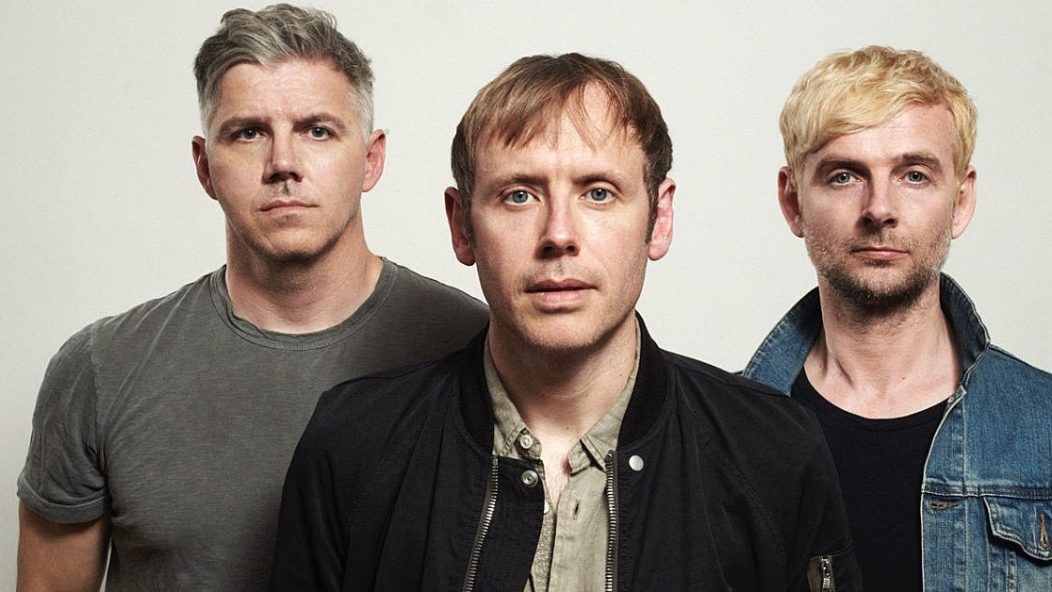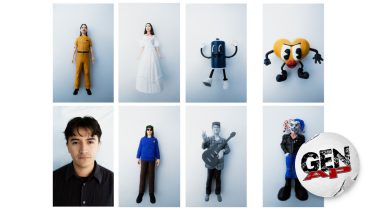
Why No Devotion’s new album No Oblivion is a rejection of nihilism, drug addiction and the void
When No Devotion released their stellar debut album, Permanence, in 2015, it should have been a time of celebration and the start of an exciting new chapter. The band, composed of Thursday vocalist Geoff Rickly, Stu Richardson and Lee Gaze, had already experienced their fair share of tragedies, and Permanence was projected to be their long-awaited victory lap and path toward recovery. However, the universe had other plans, and on the eve of the album’s release, their record label Collect Records folded due to its investor — pharmaceutical hedge fund manager, and now convicted felon, Martin Shkreli, whose criminal activity earned him the title “America’s Most Hated Man.” Shortly after the news broke about the label’s investor (with whom the band had no idea of his prior criminal or unethical behavior), Permanence instantly went out of print. From there, No Devotion went radio silent over the next seven years.
Read more: Sound and Fury Festival 2022 spotlights the new face of hardcore, from Anxious to Scowl
Even in the midst of these devastating lows, Permanence became a cult classic within the alternative music world, with many modern bands citing the record as a pivotal influence on their sound. Through the strong musical and personal relationships between the members of No Devotion, the group managed to preserve and are now reemerging with their most highly realized material to date. Their sophomore album No Oblivion captures the darkness they faced over their seven-year hiatus, the struggles of drug addiction, recovery and the harsh reality of the modern political world. The wait couldn’t be more worth it, as No Oblivion finds the perfect culmination between their collective musical history while pushing their sound to even greater heights.
No Oblivion is No Devotion’s first album in seven years. There was a notable hiatus from releasing music, the dissolution of your previous record label and generally radio silence ever since. What was the band’s collective mindset during this period?
We all thought that Permanence was going to be one and done. We thought that it would be our little secret and record that we are all proud of that was just mythically shot out of the sky, and that’s it; it’s done. Everyone had made peace with that, and I was doing Thursday again, so I guess I thought it is what is, and that’s life. Sometimes curveballs happen, and you have to deal with them. Then Stu [Richardson] sent me a track that was just piano, a ride cymbal and the sound of rain falling — there was just something so hypnotic about it. I realized that the thing I love most about No Devotion is writing with those guys. It’s so easy, and we’re all completely on the same page. I love writing music with Thursday, but each song is a different version of a street brawl happening between us; it’s brutal. I don’t know if it’s because we all grew up in New Jersey, but we all know exactly what to say to cut the other person down. [With No Devotion], we ended up writing all of No Oblivion in two weeks.
![[Photo by Liza De Guia]](https://www.altpress.com/files/2022/08/attachment-nyc2022b.jpg?w=630&h=840&zc=1&s=0&a=t&q=89) [Photo by Liza De Guia]
[Photo by Liza De Guia]
While it was relatively short-lived, Permanence made a considerable impact. Was it tough putting the band on hold while the iron was still hot?
Having the record label collapse during the first week of Permanence being out was the second punch that really knocks you down. It’s some of the proudest we have ever been of any music we have done, and both of us have accomplished much greater heights in our careers. In the seven years since then, a lot of hardcore kids have gone on to like Britpop, shoegaze and all the stuff we were hinting at with the record, which has now become a big part of the scene. I feel a little vindicated now.
You’re no stranger to overcoming obstacles and always seem to persevere no matter what. Why do you think that is, and how do you lean on each other to get through tumultuous times?
I certainly have tried to be a supportive voice and someone that my band members can lean on. I leaned on all of them when I was getting off heroin after Permanence. Going into No Oblivion, it was the first time I was making music sober, and I had to lean on them quite a bit because suddenly, there were so many raw feelings. You think that the more emotional a performance, the better, but that’s a myth. You have to have the emotion in there and subdue it enough to perform a technical or communicative vocal. You have to be in touch with that emotion without actually retraumatizing someone, and I think that was a hard one for me to figure out with this record because I was raw and didn’t have a crutch to lean on.
![[Photo by Richard Kern]](https://www.altpress.com/files/2022/08/attachment-DSC_0781-1_v1.jpeg?w=630&h=419&zc=1&s=0&a=t&q=89) [Photo by Richard Kern]
[Photo by Richard Kern]
No Oblivion feels like a culmination of all of your own respective projects converging with substantial sonic shifts. What was the intention behind this?
Going into this record, Stu was like, “You’re the singer, but just be you. I’m with you and want to make a record that is a culmination of everything you’ve been involved with or ever wanted to be involved with.” Stu now tours in Thursday and really sees where I shine and really gets inside my head. Some of these changes are quite different, but this record has its own feeling, and it feels really honest. When I really think about what ties together all these different styles together is almost this doom-metal vibe.
Thematically, what does No Oblivion touch on?
No Oblivion to me was emblematic of a choice: no nihilism, no drug addiction and how do you cancel the void? “Starlings” is about depression. Clinically, people talk about depression as a black dog that’s always waiting for you. With “Starlings,” I had this idea that it’s not a dog, but instead, it’s this prismatic, ever-changing murmuration in the sky that can even look beautiful if you misunderstand what depression is before you.
“Love Songs from Fascist Italy” is about how easy it is to sink into an environment. When you’re in a culture and it becomes so toxic, everyone should be running around screaming, but instead, we’re thinking about love and thinking about our own lives. We can see it when it’s someone else culture like, “Yes, fascist Italy was so bad,” but what are we in the middle of now? Nobody wants to talk about it, and it’s out there in the political realm, but the political realm is so exhausting. A lot of it is just about trying not to get what the kids say to not get “black pilled” — not to embrace how fucking dark it all is and trying to choose something that is not defeatism. That’s what a lot of the record is about.










